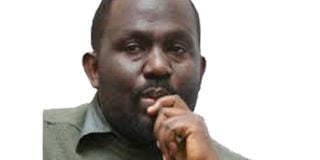Let Uganda’s music play till we feel this misery is gone

What you need to know:
Programmatic response. The difference Bobi Wine has made is, first, to weaponise it, and, second and most importantly, to infuse it with the language of demand – demanding a fair distribution of the national cake, and democratic freedom. It has forced Museveni into a programmatic response, eg appointing a musician to be an adviser on Ghetto Affairs.
There has never been a better time to be a musician in Uganda, thanks to the ever rising star of MP Robert Kyagulanyi, musician-turned-Opposition politician more popularly known by his stage name Bobi Wine.
To counter “Ghetto president” Bob Wine’s appeal, President Yoweri Museveni is wining and dining any popular musician who isn’t in the People Power camp, and garlanding them.
In the latest round, voluptuous artiste Catherine Kusasira became Presidential Adviser on Kampala Affairs, complete with military uniform, Toyota Landcruiser, and a cash-filled envelope she received from the Big Man while she was performing on stage. Singer Mark Bugembe, aka Buchaman, found himself Presidential Adviser on Ghetto Affairs, perhaps the most direct inroad yet into Bobi Wine’s marginalised urban youth base.
And the voluble singer and social media personality Jennifer Nakanguubi, aka Full Figure, emerged having shifted loyalties from the People Power side of current Ugandan politics, and hobnobbing with Museveni.
But we need to press pause. Is all of this because of Bobi Wine? Perhaps only partly. It should be remembered that before Bobi Wine entered the political stage so emphatically in 2017, one of the most popular musical-politics moments happened seven years earlier in 2010. With elections approaching in February 2011, in perhaps Museveni’s most astute “digital age” campaign, You Want Another Rap was released. Mixed from Museveni’s speeches and Ankole poetry recitals by singer and producer Richard Kawesa, it went viral, striking a chord with youthful voters, and its success reported widely internationally.
The shift to music as a platform for political messaging, in many ways, took off in 2010.
However, there is even a far deeper process underway; go back to seven years from 2010 to 2003, and another seven from there to 1996, when the first election of the Museveni/NRM was held. Both times, the people getting presidential envelopes, becoming presidential advisers, and taking delivery of four-wheel drives from the Chief, would have been wearing uniforms like Kusasira, and some might have been dreadlocked like Buchaman – but for very different reasons.
Their uniforms and long hair were the real thing, not fashion, because they would likely have been rebels who were fighting the government, and were being bought out of the bush. If you go back and read the newspapers of that time, they were full of cynical articles about how, in Museveni’s Uganda, if you wanted to be listened to seriously and to get an overflowing basket of goodies from the government, then you needed to take up a gun and go to the bush.
In that sense, the fact that it is Buchaman getting the blandishments and plum job today, and not a an Amin Onzi from the West Nile Bank Front, not just reveals how political contestation has changed in Uganda over the last 25 years, but actually represents some progress. Those days, the gunmen were on both the government and opposition side. Today, they remain only on the government side.
What, beginning in 1996, politicians like Paul Ssemogerere, Kizza Besigye, Norbert Mao, and lately Bobi Wine and the People Power contingent have done, is dramatically civilianise Ugandan politics. The language that they deployed, is the same one steeped in the liberal-democratic tradition all over the world, and that formed in Uganda during nationalist agitation for independence. With “You want another rap”, music, the language of youthful urban culture, became a political vehicle.
The difference Bobi Wine has made is, first, to weaponise it, and, second and most importantly, to infuse it with the language of demand – demanding a fair distribution of the national cake, and democratic freedom. It has forced Museveni into a programmatic response, eg appointing a musician to be an adviser on Ghetto Affairs.
It’s been a long journey for the creative arts. Post-Amin, with the gloom that had enveloped the country, the big crowd draw were groups like The Ebonies. The Ebonies offered an escape from drudgery, and served up visions of a middle class society that we had missed. That has come to pass.
When the moment needed an ironical take on post-1986 times, we had Bakayimbira Dramactors serving the mass end of the market, and Alex Mukulu catering to the higher intellectual and social sensibilities of the elite. But the country was also ravaged by HIV/Aids, and musicians like Philly Lutaya, one of the first celebrities in the world to publicly reveal they were HIV positive, serenaded us with religiously-infused reflective songs like Tumusinze, and Afrigo helping us forget it all with semandongo. The country survived.
Now, it’s worrying about its future. Cue Bobi Wine. Still, I think, Kyagulanyi is, to steal some words from Thabo Mbeki’s famous “I am an African” speech, just “the natural stage on which we act out the…deeds of the theatre of the day”. He’s not the play.
*Headline inspired by Barry White’s “Let the Music Play.”
Mr Onyango-Obbo is curator of the “Wall of Great Africans” and publisher of explainer site Roguechiefs.com. Twitter@cobbo3




